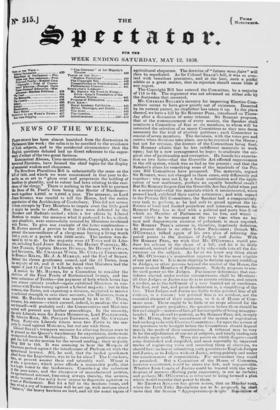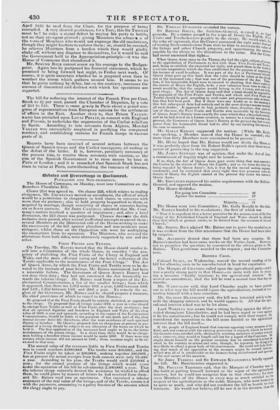NEWS OF THE WEEK.
?IRV-SPIRIT has been almost banished from the discussions in Parliament this week : the calm is to be ascribed to the avoidance of Irish subjects, and to the accidental circumstance that the Eoglish questions debated had no direct reference to the supre- macy of either of the two great factions.
Ecclesiastical Abuses, Corn-manufacture. Copyright, and Con- troverted Elections, have formed the chief topics for the display of senatorial wisdom and eloquence.
The Benefices Pluralities Bill is substantially the same as the bill of 1836, and which we were constrained in that year to de- scribe as an act to "gloss over and perpetuate the holding of benefices in plurality, and to colour bad laws relating to the resi- dence of the clergy." There is nothing in the new bill to prevent the Dean of St. Paul's from being also Rector of Stanhope— worth together 8,0001. or 9,000/. a year. The measure, as Lord Joss RUSSELL was careful to tell the House, had the entire approbation of the Archbishop of Canterbury. This did not secure it from attempts by Tory Members to impair even the little good
it might be made to effect. But these were defeated by the Ministers and Radicals united ; while a few efforts by Liberal Members to make the measure what it professed to be, a cheek
upon pluralists, were successfully resisted by Ministers combined with Tories. To give one example of the latter combination-- Mr. HAWES moved a proviso to the 27th clause, with a view to
prevent the non-residence of a clergyman having a living worth 5001.a year, or a parish with 3000 souls. The motion was de-
feated by 69 to 45. In the majority were 43 Tories and 25 Libe- rals, imitating Lord JOHN RUSSELL, Sir HENRY PARNELL, Mr. JOHN PARKER, Captain DEANS DUNDAS, Sir HUSSEY VIVIAN, Lord SEYMOUR, Mr. CHARLES WOOD, Mr. CUTLAa FERGUSSON, Sir ROBERT ROLFE, Mr. J. A. MURRAY, and the Earl of SURRY. Deduct the eleven gentlemen named, and the 43 Tories, from the majority of 69, and it will be found that Ministers had the support of just 14 of' the 70 Liberals who voted. A motion by Mr. BAINES, for a Committee to consider the abolition of the First Fruits of Ecclesiastical lit ings, and the better collection of Tenths—the payment of both which levies has been almost entirely evaded—again exhibited Ministers in con- junction withTories voting against a Liberal majority : but in this instance, the Tories, not expecting a division, neglected to muster in sufficient strength to save their servants, the Ministers, from a defeat. Mr. BAINES'S motion was carried by 48 to 27. There,
however, his success—which seemed, indeed, to naralvze the win-
nerhimself—will probably end: the Conservatives and Ministers oiled will prevent any further proceedings. In the minority,
the only Liberals were Sir Joule Honsiouse, Lord PALMERSTON, Mr. SPRING RICE, Mr. POULETT THOMSON, and Mr. CHARLES Worm. Forty-six Liberals (there were two Tories in the ma- jority voted against Ministers, but not one with them. Colonel SEALE'S trumpery measure for allowing foreign corn to be ground in the Queen's warehouses for exportation, underwent
its expected doom on Wednesday. The country gentlemen stran- gled the bill on the motion for the second reading ; their majority ,,belog 220 to 150. It was amusing to hear the Marquis of CRANDOS protest against the interference of Parliament with the agricultural interest. All, he said, that the landed gentlemen eked front the Legislature, was to be let alone! The tern-laws, then, at present answer their end tolerably well. W heat is et 60s. a quarter; which price affords a reasonable plat, that ;11 high rental to the landowners. Considering the reduction
Tlbe poor-rates, and the cheapness of manufactured articles, the agricultural interest, (ineanin,, always thereby, the owners, aot the tenants of the soil,) have season to deprecate agitation in or out el Parliament. But let a fall in the markets come, and then what a cry of lamentation will be set up, with motions about "distress," the heavy burdens on land, and all the usual topics of agricultural eloquence. The doctrine of "laissez nous faire" will then be repudiated. As for Colonel SEALE'S bill, it was so over- laid with vexatious provisions. and at the best, such a pitiful nibble at a great matter, that its rejection should cause little if any regret.
The Copyright Bill has entered the Committee, by a majority of 116 to 64. The argument was not advanced on either side by the discussion that occurred.
Mr. CHARLES BULLER'S measure for improving Election Com- mittees seems to have gone quietly out of existence. Deserted by its natural parent, no stepfather has taken it up. In the place thereof, we have a bill by Sir ROBERT Plum, introduced on Thurs- day after a discussion of some interest. Sir ROBERT proposes, that at the commencement of every session, the Speaker shall
nominate a Committee of four or six members, to whom will be intrusted the selection of as many Committees as they may deem
necessary for the trial of election petitions ; each Committee to
consist of seven members. The decisions, with the votes pro and contra when divisions take place, are to be reported to the House;
but not for revision, the decrees of the Committees being final. Sir ROBERT admits that he has indifferent materials to work upon ; but by a new arrangement he hopes to eradicate the ori- ginal sins of partisanship and corruption. He founds his expecta- tion on two facts—that the Grenville Act effected improvement in the old system, which was as bad as the present; and that the Speaker's plans for remedying some of the mischief's of the Pri- vate Bill Committees have prospered. The materials, argued Sir ROBERT, were not changed in these cases, only differently put together : why may not I, by a fresh combination and the appli-
cation of new machinery, produce an equally beneficial result ? But Sir ROBERT forgets that the Grenville Act has failed when put
to a severe trial—that the materials which it reconstructed, when pressed hard, exhibited their native rottenness ; and with regard to the Private Bill Committees, the Speaker had a comparatively easy task to perform. as he had only to guard against the in- fluence of local and limited prejudices and interests, whereas Sir ROBERT PEEL has to deal with a political and party bias Gant which no Member of Parliament can be free, and which most likely to be strongest at the very time when an ho- nest and dispassionate exercise of judgment is most required. Sir ROBERT PEEL'S scheme is, therefore, hopelessly defective.
At present there is no other before Parliament ; though Mr. O'CONNELL talked again of his own plan of referring dis-
puted points to the decision of Jiidges and Juries. With Sir ROBERT PEEL, we wish that Mr. O'Cossmets. would pro- duce his scheme in the shape of a bill, and let it be fairly examined, instead of introducing it by side-winds into all the dis- cussions on the subject. As far us we know any thing abcut it, Mr. O'Comrszt.is proposition appears to be the most eligible of any yet ma 'e. It is mere claptrap to declaim against confiding to Judges, or other persons beyond the control of the House, the power to elect Members of Parliament. Nobody proposes to con- fer such power on the Judges. Parliament determines that can- didates elected under certain circumstances shall be Members: all that Judges or Juries can do is to receive evidence, and return a verdict, as to the fulfilment of' a very limited set of conditions.
The first, and last, and great desideratum is, a simplifying of the law. That Judges and Juries are liable to die political bias of all citizens, is a truism ; but political bias is an accident, not the essential element of their existence, as it is of House of Com- mons meti. There ought to be little or no scope allowed for the operation of party prejudice; the questions before them should be few and simple—matters of fact, all but incapable of being misappre- hended. It is absurd to pretend, as Sir ROBERT PEEL did, in reply to Mr. HUME, that the amendment of the system of registration had not laitig to du with Election Committees ; for upon the nature of the questions to be brought before the Committees should depend mainly the mode of their constitution. A tribunal may tie very fit for the adjudication of one set of subjects, and totally inadequate to decide upon another. Were the points on which disputes could aiise diminished and simplified, and most especially by improved moles of registering voles and recording them at elections, we should have nu fear of submitting such questions to English Judges
and Juries, or to Judges without Junie‘, acting publicly and under the consciousness of responsibility. For misconduct they could
ha punished. But a Counnittee of the House of Commons, however constituted, would be above the law, and irrespoosible. Whether Irish Courts of Justice could be trusted with the adju- dication of tnatters affecting party supremacy, is not en Certain; and perhaps Mr. Otoxs:ELL as reluctant to bring forward a plan which would transfer that power to them.
Sit* THOMAS ACLAND has given notice, that on Monday next, when the Irish Tains Resolutions are to ba proposed, he shall move that the famous " Appropriation-prin:iplo RipiOlution of April 1835 be read from the Chair, for the purpose of being rescinded. A very shrewd gentleman, for a Tory, this Sir THOMAS must be ! lie risks a signal defeat by urging his party to battle, not on their strongest ground ; giving Ministers the advan!a .;e of the votes of Members who would not expunge the old resolutions, though they might hesitate to enforce them; or, should he succeed, lie relieves Ministers from a burden which they would gladly shake off, without any disgrace to themselves, for it would be said the Government held to the Appropriation-principle—it was the House of Commons that abandoned it.
Mr. SPRING RICE cannot screw up his courage to the Budget- point. Again has he postponed his financial statement, which he promised to bring forward last night, to Friday next week. Of course, it is quite uncertain whether he is prepared even then to weather the storm which gathers around him. It seems to us that he gains nothing by delay, but on the contrary, increases the amount of discontent and distrust with which his operations are regarded.



























